 Marine Cpl. Simon Butusov, a former student from San Diego State University’s Language Acquisition Resource Center (LARC), has earned a Navy-Marine Corps Commendation Medal for his role as an interpreter during his deployment to Afghanistan. The LARC program is held in collaboration with SDSU’s College of Extended Studies.
Marine Cpl. Simon Butusov, a former student from San Diego State University’s Language Acquisition Resource Center (LARC), has earned a Navy-Marine Corps Commendation Medal for his role as an interpreter during his deployment to Afghanistan. The LARC program is held in collaboration with SDSU’s College of Extended Studies.
STORY IN ITS ENTIRETY:
By Glenn S. Robertson
Marine Cpl. Simon Butusov, a former student from San Diego State University’s Language Acquisition Resource Center, has earned a Navy-Marine Corps Commendation Medal for his role as an interpreter during his deployment to Afghanistan.
Butusov is one of more than 300 Marines and soldiers who have trained at the Center to learn Pashto before deploying to Afghanistan since 2009.
There are a number of instances where miscommunications in culture … ended in violence because cultural sensibilities were not observed.
During a six-month deployment to Sangin, in the Helmand province of Afghanistan, Butusov filled a role usually taken by a local Afghan, serving as a translator between the Marines and the local nationals – in addition to his usual vocation of vehicle commander.
Six months in Sangin
As an interpreter, he translated for village elders and other key leaders, communicating with more than 1,000 local nationals — improving security, saving lives and increasing the effectiveness of his platoon while partnered with Afghan security forces. These efforts led to his being honored with the medal.
Most importantly, Butusov said, it helped him resolve conflicts and misunderstandings without even the threat of violence. By the end of the deployment, his efforts largely helped build trust between the deployed Marines and the local village, strengthening an at-first strained relationship.
Though Butusov has since left the Marine Corps to pursue a degree in Communication, he hopes to blend his experience and education together to work abroad in a diplomatic capacity in the future.
Eliminating miscommunication, saving lives
One of the most important outcomes of the training, said Farid Saydee, director of the Afghan Language and Culture Program, is that incidents of bloodshed are less likely to occur when deployed military members enter the country with a better understanding of Afghani cultural norms.
“There are a number of instances where miscommunications in culture — many that may have even been conceived as a good intention — ended in violence because cultural sensibilities were not observed,” Saydee said.
One such incident he mentioned was the NATO effort to bring soccer balls emblazoned with flags of a number of different nations, including Saudi Arabia. The Islamic declaration of belief, which is considered a holy text, is written on that flag and placing it upon something such as a soccer ball would be insulting to Muslims. The ensuing furor over the slight led to riots and several people being killed, Saydee said, and could have been prevented had there been a better understanding of Afghan culture.
Preparing Marines and soldiers
Through SDSU’s Language Acquisition Resource Center, Marines attend intensive classes in Pashto language and culture on the SDSU campus for eight weeks. The course instructors teach them basic Pashto through speaking, reading, listening, and an understanding of culture. In addition to common phrases and idioms, the Marines are educated in the language necessary for everyday interaction in Afghanistan and the Pashtunwali social codes that underlie Afghan life and culture.
The program receives funding from the Defense Language and National Security Education Office, which is part of the DoD office of Personnel and Readiness. Most of the students coming through the class are junior enlisted Marines, with a few exceptions, said Chris Brown, managing director of the Center’s Language Training Center Program.